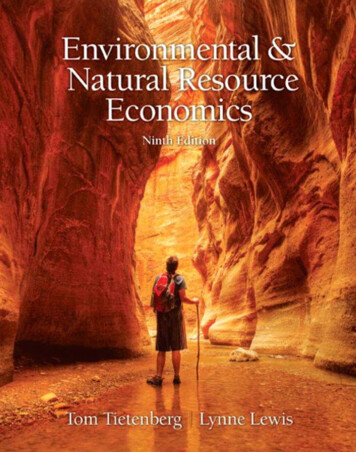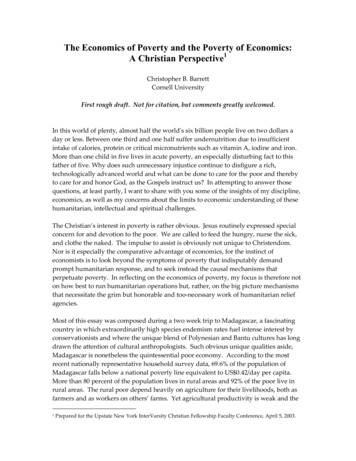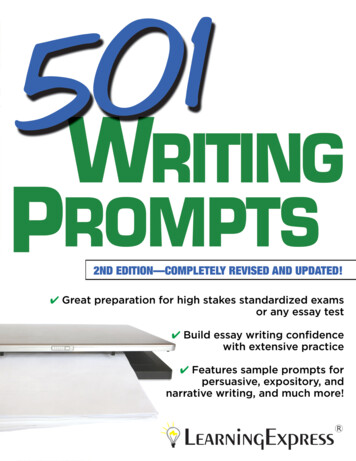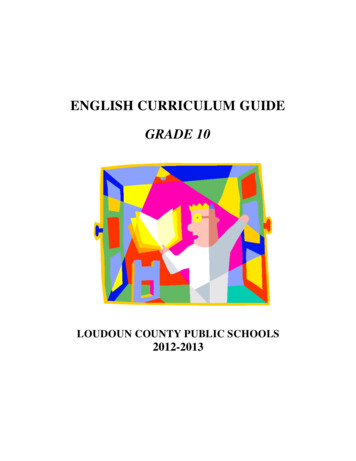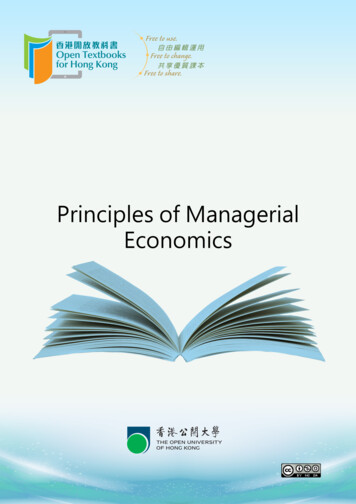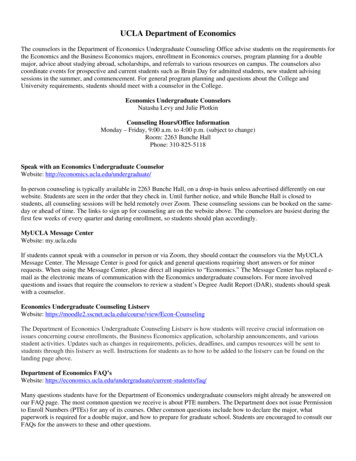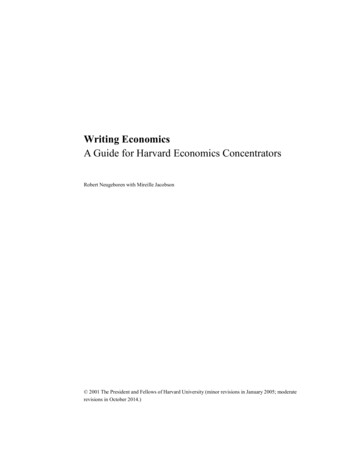
Transcription
Writing EconomicsA Guide for Harvard Economics ConcentratorsRobert Neugeboren with Mireille Jacobson 2001 The President and Fellows of Harvard University (minor revisions in January 2005; moderaterevisions in October 2014.)
AcknowledgmentsThis guide was proposed and supported by The Harvard Writing Project. Nancy Sommers, Sosland Directorof Expository Writing, and Kerry Walk, Assistant Director of the Writing Project, read drafts, gave advice,and saw the project through from inception to completion. Kerry Walk wrote the section on Formatting andDocumentation (Chapter 5). Christopher Foote, Visiting Assistant Professor of Economics and formerDirector of Undergraduate Studies, wrote part of Chapter 3 and commented on drafts of the whole work.Oliver Hart, Michael Murray, Lorenzo Isla, Tuan Min Li, Allison Morantz, and Stephen Weinberg also gavevery helpful comments. Special thanks to Mireille Jacobson, who compiled the appendices, added examples,and revised and proofread the text. Thanks also to Anita Mortimer and the Economics UndergraduateAdvising Office.
ContentsIntroductionEconomics ResearchWriting and Research Opportunities in the ConcentrationPlan of this Guide1113One Writing EconomicallyThe Keys to Good Economics Writing44Two Types of Economics PapersThe Theory PaperThe Empirical PaperThe Combo Paper7789Three Finding and Researching a TopicGetting StartedFinding a TopicFinding and Using Sources10101011Four Citations and ReferencesPlacing Citations in Your PaperListing Your References141415Five Putting it All Together: The Research PaperOutline of a PaperThe IntroductionReviewing Relevant LiteraturePresenting Your Data and Proposed MethodologyPresenting Your Results / by Chris FooteDiscussing Your Findings21212123242529Appendix A Searching through Existing Literature30Appendix B Data Sources31Appendix C Fields in Economics34REFERENCES37
IntroductionEconomists study everything from money and prices to child rearing to the environment. They analyzesmall-scale decision-making and large-scale international policy-making. They compile data about the pastand make predictions about the future. Many economic ideas have currency in everyday life, cropping up innewspapers, magazines, and policy debates. The amount you pay every month to finance a car or new homepurchase will depend on interest rates. Business people make investment plans based on expectations offuture demand, and policy makers devise budgets to achieve a desired macroeconomic equilibrium.Across the broad range of topics that interest economists is a unique approach to knowledge, somethingcommon to the way all economists see the world. The purpose of this guide is to help you understand howeconomists approach and produce research so you too can think about – and write research as – an economist.ECONOMICS RESEARCHIn your introductory economics courses, you were introduced to key principles in economics such as scarcity,rationality, and incentives. Thus, good economics research questions generally embody these fundamentalprinciples. The wide applicability of these principles means the range of topics that economists study is vast.Will school vouchers improve the quality of education? Do politicians manipulate the business cycle? Whatsort of legal regime best promotes economic development? Why do cities have ghettos? What can be doneabout grade inflation? Why do people procrastinate in saving for retirement – or in doing their homework?Indeed, insofar as it can be characterized as choice under constraint, any kind of behavior falls withinthe scope of economic analysis. As Lord Lionel Robbins (1984), one of the great economists of the twentiethcentury, put it:We do not say that the production of potatoes is economic activity and theproduction of philosophy is not. We say rather that, in so far as either kind ofactivity involves the relinquishment of other desired alternatives, it has itseconomic aspect. There are no limitations on the subject matter of EconomicScience save this.WRITING AND RESEARCH OPPORTUNITIES IN THE CONCENTRATIONAs an economics concentrator at Harvard, you will have many opportunities to undertake writing andresearch in economics. Chief among them are the sophomore tutorial, junior seminars, and the honors thesis.1 Writing Economics
Sophomore Tutorial (Economics 970)The goal of the Sophomore Tutorial is to help you learn to read and understand economics research, as wellas to undertake your own research project. To this end, you will receive several assignments throughout thesemester: Final Research Paper (15-18 pages). All tutorials require you to write a research paper thataddresses a topic in depth and combines skills developed throughout the semester. It usuallybuilds on earlier short assignments, including a prospectus, in which you propose a questionand detail how you will try to answer it. The research paper typically includes a discussion ofrelevant literature, an empirical component, a discussion of results, and perhaps a discussionof policy implications.Empirical Exercises (page length varies). All Ec 970 students have to complete empiricalexercises in which you analyze economic data using a standard statistical software package(Stata). These exercises give you experience in using statistical software to organize andanalyze data, which is an important part of your final paper.Short Essays (4–6 pages). Short essays may require you to analyze two articles and comparetheir policy implications, explain a model, criticize an argument, present a case study, extend atheory, evaluate an intellectual debate, and so on.Response Papers (1–2 pages). Response papers might involve summarizing the weeklyreadings or answering a specific question. These will help get you thinking and stimulateclass discussion. They can also build the skills needed for writing successful longer papers.Other writing assignments vary by tutorial and may include referee reports, peer feedback,preliminary pieces of the final research paper, and so on.Make sure you clear up any confusion about the assignment by asking your tutor specific questionsabout what he or she is looking for. The earlier you get clarification, the better able you will be to completethe assignment. Additionally, you may be required to hand in rough drafts. Getting feedback improves yourwriting considerably and generally makes for more interesting papers.Junior Seminar (Economics 980)Junior seminars offer another (more advanced) exposure to the research process. All junior seminars requirea major research paper. During the semester, students build towards this goal with smaller intermediatewriting assignments. The end product is an empirical and/or theoretical exploration of an idea related to theseminar’s topic. Junior seminars provide students with a wonderful opportunity to apply the analysis andwriting skills developed during the sophomore tutorial. They also provide a great experience for studentsthinking about embarking on a senior thesis.Senior Honors ThesisThe senior honors thesis provides students with an opportunity to investigate some idea, theoretical issue,policy problem, or historical situation of keen interest. Perhaps equally important, a thesis stretches students’intellectual muscles.The Senior Thesis Research Seminars (Ec 985) are full-year seminars required of seniors writinghonors theses. It is a venue for students to regularly present their work-in-progress and to discuss their thesisindividually with their Ec 985 instructor. The seminar focuses on research design, methodology, datasources, analysis methods, and bringing this all together in a coherent, well-motivated, interesting economicsthesis.2 Writing Economics
PLAN OF THIS GUIDEThis handbook should serve as a companion to the above courses and as a reference anytime you are writingand doing research in economics. Chapters One through Four take you through the various aspects of writinga research paper, and Chapter Five guides you on putting all your work together into creating a coherent,interesting, thorough research paper.In addition, three appendices provide useful information for your research process. Appendix A listssome key electronic indices and databases for searching through academic literature. Appendix B lists somebasic sources and Appendix C provides a short discussion of some key fields in economics to help discoverbroad areas you might find interesting.3 Writing Economics
One Writing EconomicallyPick up any economics journal and you will discover a few things about writing economics. First, thediscourse is often mathematical, with lots of formulas, lemmas, and proofs. Second, writing styles varywidely. Some authors are very dry and technical; a few are rather eloquent.You don’t have to be a great “writer” to produce good economics writing. This is because economicswriting is different from many other types of writing. It is essentially technical writing, where the goal is notto turn a clever phrase, hold the reader in suspense, or create multi-layered nuance, but rather to achieveclarity. Elegant prose is nice, but clarity is most important. A clear, organized paper allows the strength ofyour underlying analysis and the quality of your research to shine through.If you’ve ever pulled an all-nighter and done reasonably well on the assignment, you may be temptedto rely on your ability to churn out pages of prose late at night. This is not a sensible strategy. Goodeconomics papers don’t just “happen” without time spent on preparation; you cannot hide a lack of research,planning, and revising behind carefully constructed prose. More time will produce better results, thoughreturns to effort will be diminishing at some point. Here, too, the principles of economics apply.THE KEYS TO GOOD ECONOMICS WRITINGWriting in economics, as in any academic discipline, is never simply a matter of asserting your opinions.While your ideas are important, your job includes establishing your credentials as a writer of economics bydemonstrating your knowledge of economic facts and theories, identifying and interpreting the underlyingeconomic models, understanding what others have said about the relevant issues, evaluating availableevidence, and presenting a persuasive argument. Even if you don’t write particularly well, you can producegood economics papers by attending to the following:ResearchResearch entails reading previous literature in a subject area (see Appendix A) and, for empirical work,finding and analyzing data (see Appendix B). The more thorough your research, the stronger your paper.This is discussed in Chapter Three.AnalysisRegardless of your topic, a good research paper requires a careful analysis in order to make conclusions aboutthe originally posed question. Analytical skills are particularly important when using mathematics orstatistics to create models or analyze data in order to answer your question. This is discussed in ChaptersTwo and Five.4 Writing Economics
OrganizationOnce you have found data sources and relevant literature, you will need to organize your ideas and outlineyour paper. An excellent research effort can easily be overshadowed by a disorganized presentation of ideas,methodology, and/or findings. This is discussed in Chapter Five.ClarityAn overarching goal to strive for in writing a research paper is clarity. Clear writing is easy to read buthard to write. It rarely occurs without considerable effort and a willingness to revise and rework. AsMcCloskey (1985), the dean of economics writing, tells us: “it is good to be brief in the whole essay and inthe single word, during the midnight fever of composition and during the morning chill of revision”(McCloskey, 1985). The rules of clear writing apply not only to the organization of the entire paper, but alsoto the order of paragraphs, sentences, and words. Few writers achieve clarity without continual editing.Once you have your basic ideas down, be sure to reread and revise your work.Clarity can be achieved in stages: Clearly state your research question/hypothesis.Organize your ideas into an argument with the help of an outline.Avoid excess verbiage.Edit your paper seriously, remove what is not needed, and keep revising until you get down toa simple, efficient way of communicating.This last stage is crucial. Take, for example, the following excerpt from a student’s short response paper:In the beginning of the 1980’s, the problem of homelessness in the United Statesbecame apparent (Freeman and Hall, 1989). Since then, the number of homelessin this country has continued to grow. While the problem of homelessness, initself, is obviously a problem that is quite relevant to other fields of economicstudy, it has also given rise to a phenomenon that is an interesting topic for thestudy of behavioral economics: the donation of money to help the homelesspopulation.With a little revision, the author could have achieved a more clear and concise introduction:In the early 1980s, increasing homelessness in the United States becameapparent (Freeman and Hall, 1989). Since then, the number of homeless hascontinued to grow. While homelessness is studied in many fields of economics,the phenomenon of donating of money directly to the homeless is particularlyinteresting to behavioral economists.On the following page are some additional tips to achieving clarity, with examples. These and manyother useful tips can be found in Strunk and White (1979).5 Writing Economics
Use the Active VoiceTurn a weak, passive statement into a more direct assertion:(weak, passive voice) In this paper, the effect of centralized wage-settinginstitutions on the industry distribution of employment is studied.(direct, active voice) This paper studies the effect of centralized wage-settinginstitutions on the industry distribution of employment.Put statements in Positive FormMany day-traders did not pay attention to the warnings of experts.This statement is more concisely conveyed as:Many day-traders ignored the warnings of experts.Omit Needless WordsIn spite of the fact that the stock market is down, many experts feel that financialmarkets may perform reasonably well this quarter.A better way to express the same thing is:Although the stock market is down, financial markets may still performreasonably well this quarter.Generally Stick to One TenseThis study showed that dividend payouts increase when dividend income wasless tax-disadvantaged relative to capital gains.Instead, use present tense throughout:This study shows that dividend payouts increase when dividend income is lesstax-disadvantaged relative to capital gains.6 Writing Economics
Two Types of Economics PapersThe economy is a complex web of interdependent elements, and understanding any part is a significantaccomplishment. The price of tea in the U.S. is determined by many factors, including individualpreferences, labor costs, weather conditions and the price of tea in China, among others. These factors are inturn connected to other factors, including the price of coffee, which in turn can affect the price of tea. All ofthese parts can be moving simultaneously, making it hard to see what is causing what.To write effectively about economics, you have to understand how economists think about suchcomplicated phenomena. In general, to make their task easier, economists try to focus on simple causalconnections – often between two variables – ceteris paribus, or “other things being equal.” “Other thingsbeing equal,” what is the effect of a change in labor costs on the price of tea? “Other things being equal,”how does a change in the price of coffee affect the price of tea?This kind of analysis allows economists to say something very precise about well-defined relationshipsand to run rigorous tests to measure the strength and direction of their connections. Of course, focusing onone relationship at a time means other relationships are artificially held constant, so that our analysesnecessarily diverge from reality. A good economist knows the real world is more complex and uses theirsimplifications as first steps towards understanding reality.Such analyses are formally investigated and written as a paper in one of three broad categories:theoretical papers, empirical papers, and papers that present a theoretical model with a related empirical test.As with anything, there are always exceptions. There exist excellent writings on economic thought,intellectual analyses of historical events, review pieces of large areas of research, and much more.THE THEORY PAPERA theory paper presents some aspect of the world through the lens of a model. Economic models aresimplified representations of how economic phenomena work, rendered in precise, usually mathematical,terms. The goal of the theory paper is to help us understand the world and make predictions about it. Supplyand demand, cost/benefit analysis and comparative advantage are examples of basic theoretical models.A theory paper can introduce an entirely new model, or it can critique or extend an existing model. Inboth cases, the theory paper improves the conceptual underpinnings of the analytical tools we use tounderstand the actual economy. A theory paper, for instance, may present a better model of how firmsbehave in uncertain market conditions, or a new way to measure the level of national economic activity, or asynthesis of existing theories to produce a new, more general theory.A classic example of the theory paper is Gary S. Becker’s “Theory of Marriage” (1973), in which theauthor applies the theory of preferences to model the marriage market. He derives from his model variousbehavioral implications (such as how the division of labor occurs within marriages). The economicmotivation that Becker provides for his model is that marriage plays a central role in many phenomena of7 Writing Economics
interest to economists (population growth, labor force participation trends, and inequality, to name just afew).Theoretical ModelsA theory paper is generally characterized by a model: a simplified representation of an economicphenomenon. Economists build models the way curious scientists do: reduce the phenomenon to its basicelements and combine these elements so as to produce a model that resembles the original in relevantrespects.Economic models specify relationships between two kinds of variables: exogenous and endogenousvariables (Mankiw, 1997). Exogenous variables are inputs to the model, factors that influence what happensbut are themselves determined “outside” the model. They are “givens”: fixed values that are assumed not tochange over the period of analysis. Endogenous variables are outputs of the model, determined “within.”Usually, a mathematical function is used to represent the relationship between exogenous and endogenousvariables. Systems of relationships, in which changes in one area have different consequences in others, areoften conveniently represented by systems of functions.Models allow one to make predictions about the real world economy; both forward-looking predictionsabout, say, future interest rates and backward-looking predictions about, say, the savings rate during thedepression. Models also provide guidance about where to look for and how to look at data, and they providea structure on which the rest of the paper can hang.While not all theoretical papers involve a mathematical model, the majority do. Economic theory wasnot always so mathematical, and the mathematization of economic theory has had costs as well as benefits.The benefits are that, in many cases, more can be said quickly and precisely, because mathematics is apowerful language and convenient shorthand. The cost is that not all relevant phenomena are easily cast inmathematical terms or can be only crudely captured mathematically. Another cost is that economic theorybecomes somewhat less accessible to students and to the world at large, in which public policy debates areconducted. Thus, a well-written theoretical paper additionally provides a simple, intuitive explanation of thekey implications of the mathematical analyses.THE EMPIRICAL PAPERA theoretical model’s predictions about the future or the past are essentially empirical hypotheses: claimsabout how an economic phenomenon works. If theory papers help us frame the way we see the world,understand it, and make predictions about it, empirical papers enable us to test theories and measurerelationships. By how much does police presence reduce crime rates? How much does an additional year ofschooling boost earnings? These types of questions often have significant policy implications.Most economists, aspiring to be good social scientists, would like to test their hypotheses underlaboratory conditions. This is often not possible, although it is becoming increasingly common in the field ofpsychology and economics. In many cases, though, we need to gather data from the real world – by lookingat census reports, balance sheets and the like – and use statistical methods to test our models and hypotheses.Much economic data come in, or can be transformed into, numerical terms. But a long list of numbersis just that until a relationship among them can be specified that imparts some order. By building and usingstatistical tools, economists are able to focus on simple, sometimes subtle, relationships in the data andexplain the causal links at work. Finding a pattern in the data allows one to say something about how theeconomy works. Such analyses tend to be complex; thus, empirical papers make use of a variety of differentstatistical tools and approaches (such as regression discontinuity designs, propensity scores, and instrumentalvariables), as you will learn in your econometrics course(s).8 Writing Economics
In the field of development economics, randomized trials1 have grown dramatically in popularity overthe last few years. The rigorous impact evaluations that such experiments enable have driven a growing bodyof empirical literature on “what works” in development. One of the earliest examples of such randomizedtrials is the Progresa program in Mexico, which provides cash transfers to poor households in villagesrandomly assigned treatment status. The cash transfers were conditional on recipients taking specific steps topromote good health (such as immunizations, preventive check-ups, and nutritional monitoring andsupplementation) (Gertler, 2004). Gertler (2004) uses Progresa data to analyze the impact of theseconditional cash transfers on child health outcomes in Mexico. Because the cash transfers were randomlydistributed among eligible villages, a simple OLS regression analysis is, broadly speaking, enough to identifythe effect of the cash transfers. Gertler’s (2004) finding that conditional cash transfers have significant,sizeable impacts on children’s health outcomes is a valuable contribution to the policy debate on how toimprove health outcomes in developing countries.Writing up and discussing empirical results is a skill to develop all its own; this is discussed in detail inChapter Five.THE COMBO PAPERPapers with both a theoretical and empirical component arise under a number of different circumstances.Sometimes a paper may require a theoretical “backbone” on which the empirical analysis can hang. Othertimes, the author of a theoretical paper analyzes some data to calibrate the model (that is, to estimate valuesof key parameters of the model) or to test certain implications of the model “in the real world.” And stillother times, the empirical findings of a paper warrant the generation of a theoretical model to betterunderstand those findings. For example, Autor et al. (2006) dissect data on wages and employment todescribe the rising polarization of the labor market into high-skill and low-skill jobs at the end of thetwentieth century. The authors follow this empirical analysis with a theoretical model that explains thispolarization as the result of computerization: automation substitutes for routine, repetitive tasks but providesa complement for workers performing skill-intensive tasks.1“Randomized control trials” (RCTs) broadly refer to providing a ‘treatment’ (such as a good or service orimplementing a policy) to some individuals or areas but not to others. The goal is to be able to reliablymeasure any differences between groups that did versus did not receive the treatment, in order to see if thetreatment leads to any changes in particular outcomes.9 Writing Economics
Three Finding and Researching a TopicEconomists view the world through the lens of efficiency, focusing on individuals’ behaviors and the problemof allocating scarce resources. From this common analytical perspective, economists study a wide range oftopics, involving the behavior of individuals, organizations and nations. The economic approach can beapplied so broadly that choosing a topic to write on can be difficult. Indeed, once you start looking at theworld through the eyes of an economist, almost anything can be analyzed in terms of choice under constraint.GETTING STARTEDGetting started is often the hardest part of a research project. The world of possibilities before you can makethe process of a writing research paper seem daunting. Don’t let these concerns paralyze you; break downthe project into smaller parts, and get started on the simpler tasks. For example, your project will likelyconsist of finding a topic, reviewing relevant literature, finding data, carrying out empirical analyses, and soon. You can further divide each of these tasks into smaller parts. For example, when you’re ready to startexploring the literature (more on this in Chapter Five), you can break this seemingly straightforward task intosmaller parts: list the papers you already knowsearch EconLit (see Appendix A) to identify a list of potential papers to readread through those papers’ abstracts a few at a timechoose some papers to read more carefully.In Chapter 5, we discuss all the key parts of the paper; you can use this as a guide for creating your list ofsmaller tasks.It is also important to manage your time. The best laid plans for writing a good paper can be wreckedby poor time management. Clear up any confusion about the assignment right away. Set yourself deadlinesfor completing each phase of the project. Hold yourself to the deadlines you set, and allow yourself time torevise and polish the paper. The payoff will be a better product and less anxiety throughout.FINDING A TOPICYou need a topic before you can begin. If your instructor gives you a list of topics, a review of relatedresearch may help you choose among them. If the research question is entirely up to you, a literature searchmight not the best way to begin. Immersing yourself in the literature before you have found a topic maymake you feel like all the interesting questions have already been tackled. Instead, reflect on issues you think10 Writing Economics
are interesting and important. You can also browse the list of fields in economics (Appendix C) to see whatbroad areas you find interesting.Though there is no one way to find a topic, thinking of the issues that interest you is a great place to begin.While the range of possible topics is large, there are some well-defined fields in economics, and your owninterests are likely to fit into one of these (see Appendix C). Course materials, textbooks, handouts, and so onare obvious and convenient places to look, especially since your topic will most likely have to pertain to thecourse subject. But reading the newspaper and keeping an eye on current events can also be helpful. Onceyou have a general idea of what you’re interested in researching, you should go to the literature and see howeconomists have tried thinking about it.For example, say your interest is piqued by recent shootings in both schools and workplaces. Whatrole has the availability of guns played in these events? What are the effects of banning guns? Implementingtougher gun control laws? Though this might initially strike you as a government or law project, many of theunderlying issues are fundamentally economic – gun control measures explicitly place limits on supply andattempt to put guns in disfavor or reduce demand. Once you have identified guns and gun control as an areaof interest, do your literature search (more on this later). Pick out the relevant articles and scour them forcontent as well as for additional sources. Try to narrow down your topic. Have the authors pointed out anyfuture research areas? Are there any issues that you think have not been fully addressed?In addition to finding something that interests you, you will also need a project that can be done withinthe parameters of the assignment (for example, length, due date, access to research materials). If the topicdoesn’t interest you, you probably won’t put in the effort needed to do a good job or ask the right questionsalong the way. On the other hand, a profoundly interesting topic may not be manageable given the time andother constraints that you face.As another example say you are interested in the stock market and want to know what determines stockprices. From basic economic theory, you know that prices are determined by supply and demand, but whatspecific relationships do you need to study and what data do you need to gather? You think about it for awhile and realize there are many parts to your question. What determines the price of a particular company’sstock is a different question from what determines the level of stock prices in general (as measured by DowJones or another index), though the two may be related. And what determined stock prices yesterday mightbe different from what explains changes in stock prices in the future. Each of these questions could be thesubject of an interesting paper. Your original topic was overly broad; you should focus on a sin
writing is different from many other types of writing. It is essentially technical writing, where the goal is not to turn a clever phrase, hold the reader in suspense, or create multi-layered nuance, but rather to achieve clarity. Elegant prose is nice, but clarity is most i

